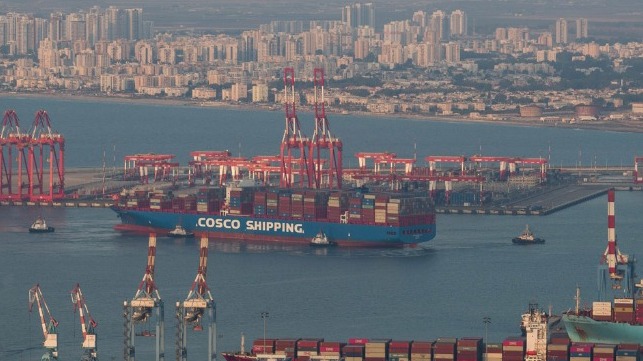
The first large containership arrived at Israel’s new terminal over the weekend in advance of the official opening of Haifa’s Bay Port on September 1. Six years in the making, the private terminal has been a controversial project as it was developed and will be operated by the Chinese Shanghai International Port Group.
With an investment valued at over $1.5 billion, the new Bay Port terminal is one of the largest infrastructure projects in Israel’s history. The project is seen as a critical step for the Israeli economy as it expands the northern port of Haifa to handle among the largest containerships in the world. There are more than 2,600 feet of wharf as well as state-of-the-art automated container handling equipment. The SIPG terminal will be capable of handling containership with a capacity of up to 18,000 TEU.
The COSCO Shipping Alps, a modern 14,568 TEU boxship arrived in Haifa on August 28 from Piraeus, Greece. The 153,679 dwt vessel also became the largest containership to arrive in Israel. While it is the first official commercial visit to the new port, the vessel is largely a demonstration of the port’s capabilities. During its stay, it will only be loading empty containers that have been stuck in Israel through much of the pandemic.
In July, the first vessel arrived at the new Bay Port terminal as a practice session. The MSC Marylena, a 23,487 dwt boxship made a test call at the port. The smaller vessel, with a capacity of 1,658 TEU, also loaded empty containers in a trial of the facilities.
While the new terminal marks a significant advancement in capabilities, SIPG admitted to the Israeli news outlet The Globes that it will take some time to build traffic. The Chinese company said that many of the shipping companies operate under annual contracts with terminals and as such it only expects two to four ships a month at the terminal during 2021. They have begun negotiations with the shipping lines for 2022.
The port project, which was awarded by the state-owned Israel Ports Company, faced stiff criticism. There was political opposition to the awarding of the contract to a Chinese company and numerous efforts to block the development. The Globes reports that much of the infrastructure around the port is behind scheduled and only partially completed. For example, the newspaper says “the access road to the new port is partly paved,” with many parts of the support infrastructure only expected to be completed in two years.
The new terminal is also likely to face competition in the future. A second private port is under development at Israeli’s southern port of Ashdod. Due to open in a few months, it too will have a deep water terminal.
The Israeli government has been seeking to encourage private port development along with a plan to sell off assets of the Israel Ports Company. The strategy is designed to support the modernization of the ports and investments in the infrastructure as well as create new competition. The hope is that it will drive down costs for imports as 99 percent of imported goods arrive via Israel’s main ports. Earlier this month, Reuters reported that at least four major international groups were partnering with Israelis for the upcoming bidding on the old port of Haifa. Bidding is expected to officially begin in the fall with the proposal calling for the successful bidder to make significant investments to upgrade the port facilities.
SOURCE READ THE FULL ARTICLE
https://www.maritime-executive.com/article/large-containership-arrives-in-israel-for-opening-of-haifa-terminal